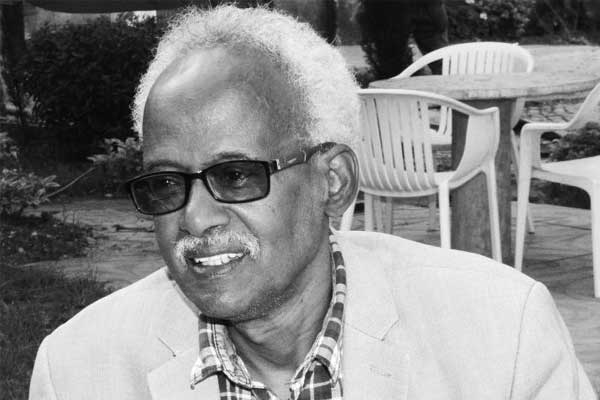In Memoriam
Professor Tenkir Bonger Member of FSS
1948 – 2020
Professor Tenkir Bonger, a retired professor of development economics at various universities in Africa and elsewhere, passed away on 7 December, 2020 at the age of 72, after a long illness, and was buried on the next day in a new Muslim cemetery next to Lebu Gebriel Church in Addis Ababa. Tenkir was an old friend with whom I had an active intellectual exchange for some three decades. When I first met him in London during a visit to the School of Oriental and African Studies in October 1991, he was preparing for publication his English translation of the famous book of Gebrehiwot Baykedagn, Mängest ena Yä-Hezb Astädadär (first published in Addis Ababa in 1917 EC and reprinted several times since) under the title State and Economy in Early Twentieth Century Ethiopia, which was later published by Karnak House and Red Sea Press (London and Trenton, NJ, US:, 1995). I was struck by his great interest -and wide reading – in Ethiopian history in spite of the fact that his doctoral degree was in development economics. Since then we kept in touch, and I found him intellectually stimulating and challenging. In all the years that I have known Tenkir, I was able to observe his passion to understand the development conundrum and his continuous efforts to formulate a theory that would explain the puzzle that is underdevelopment.
Professor Tenkir was born in 1941 EC (1948/9) in the village of Yeshwe, Gumer district, Gurage Zone (formerly Chebo and Gurage Awraja) in the Southern Ethiopian Nation-Nationalities and Peoples Region from his father Ato Bonger Seba and his mother, W/o Yesreshewat Korma. After attending his elementary education in Wolqite town (currently the administrative centre of Gurage Zone) and his secondary education in Ambo (currently the administrative centre of the Western Shewa Zone of the Oromia Region), he passed the national examination to join the Prince Baede Mariam School, affiliate of Haile Selassie I University (currently Addis Ababa University), which prepared students to join its Education Faculty. He obtained his bachelor’s degree in geography education in 1970. He continued his advanced studies in the United Kingdom where he did his Masters degree in agricultural economics in Reading University, and obtained his PhD in economics from the School of Oriental and African Studies of the University of London upon the presentation of his dissertation, ”Agrarian Structure, Agrarian Reform and Agricultural Technology in Ethiopian Agriculture with special reference to the Arsi Region” in 1987.
In his career as an academic, he taught in different countries –the University of Zimbabwe (1992-96), Unity University, Addis Ababa (2006-2007), Copper Belt (2007-2009) and Mulungushi (2009-2015) universities, both in Zambia. In between these teaching positions, he worked as a senior research fellow in different institutions – Economic Policy Research Centre, Kampala, Uganda (1996-1999), Ethiopian Development Research Institute, Addis Ababa (1999-2002), and Sir Arthur Lewis Institute of Social and Economic Research, University of the West Indies, Bridgetown, Barbados (2002-2003).
Since the completion of his doctoral studies, Professor Tenker was continuously engaged in research, which enabled him to bring out an impressive number of publications. After the thesis, his first major work (1995)was the translation of Gebrehiwot Baykedagn’s book, which brought this highly original treatise to the attention of the intellectual historians of Africa in the Colonial Age – and of course to the wider interested public. His next publication was a monograph with CODESRIA. Titled:The Interface of Agrarian Structure, Agrarian Reform, Agricultural Technology & the Problems of Accumulation in Ethiopian Agriculture (CODESERIA Monograph Series, No.2, 1996), this book enabled him to develop further some of the insights he enunciated first in his doctoral dissertation.Though he has been a fervent admirer of Gebrehiwot Baykedagn for, among other reasons, writing on political economy of development in Amharic, though he always advocated that academics should publish in Amharic, he himself used English for much of his career. But finally, he published a substantial book on economic development entitled የኢትዮጵያ እድገትና ልማት፡- ከየት? ወደየት? እንዴት? (Addis Ababa, 2005)He reported his research in a series of articles that came out in highly reputed economic journals and book chapters. Recently, he brought together into a book nine articles and essays under the title: Some Aspects of the Socio-Economic/Institutional Bases of Rising Africa: Studies from Ethiopia, Uganda, Zambia & Zimbabwe – Flow of Global Best Practices in Development to and from Africa (Addis Ababa, 2018).
A thread that, in my opinion, runs through his writings is his position that the state in Ethiopia or elsewhere in the developing world should play an active role in the economy; he goes to the extent of supporting the notion of the developmental state without of course being fanatical about it. Interestingly he always makes efforts to anchor his contemporary research findings in a historical context. He posits that the Ethiopian socio-political system was a tributary system and, on this basis, he critiques the assumptions of radical intellectuals of the 1970s who premised their analysis on the notion that the pre-revolution Ethiopian formation was a feudo-bourgeois one. His main focus was always on agriculture and the rural areas. His conclusions are based on hard empirical evidence.
Tenker was a very fine human being. He was considerate and loving to his family of three – his wife, Anne, and his two sons, Kereji and Yesak. To his friends, he always showed affection and care. I personally found him a warm, welcoming and generous person.
Shiferaw Bekele ( Prof)
December 2020

